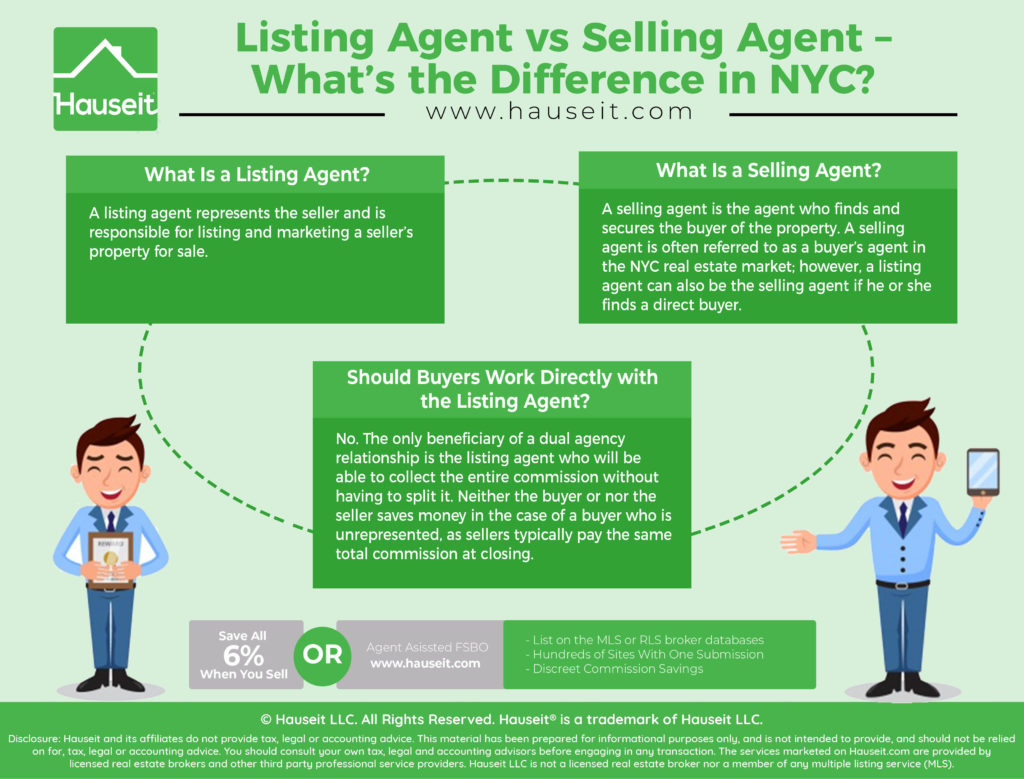A listing agent represents the seller and is responsible for listing and marketing a seller’s property for sale. A selling agent is the agent who finds and secures the buyer of the property. A selling agent is often referred to as a buyer’s agent in the NYC real estate market; however, a listing agent can also be the selling agent if he or she finds a direct buyer.
Table of Contents:

A listing agent is synonymous with a seller’s agent, both of which are very commonly used terms in the NYC real estate market. A listing agent is named as such because he or she is responsible for listing the seller’s property and finding buyers who can consummate a deal.
The listing agent is sometimes referred to as the seller’s agent because he or she has a fiduciary duty to be loyal to and act in the interests of the seller.
A seller’s agent can also represent a direct buyer simultaneously under what’s called a dual agency arrangement.
Listing agents must present NY Agency Disclosure Forms to all walk-in, direct buyers so there’s no confusion whom the listing agent represents. If all parties agree to dual agency, then the listing agent represents and must act in the interests of both the buyer and the seller.
A Full Service Listing for 1%
Sell your home with a traditional full service listing for just one percent commission.
A selling agent is someone who procures a buyer for a listing. A selling agent can and usually is a completely different agent than the listing agent. However, if a listing agent finds a direct buyer who does not have their own representation, then the listing agent can also be the selling agent.
The term selling agent is used very infrequently in the NYC real estate market due to its confusing nature. Instead, agents who represent buyers on a transaction are known as buyer’s agents, buyers’ agents, buyer agents, buy side agents or some other combination thereof.
Buyer’s agents have a fiduciary duty to be loyal and to represent the interests of their buyer clients. If a buyer checks out properties listed by the same brokerage at which the buyer’s agent works, then a potential conflict of interest may occur. In this situation, dual agency must be properly explained and disclosed.
No, it doesn’t make sense for buyers to agree to dual agency because a dual agency relationship benefits neither the buyer nor the seller.
In fact, the only beneficiary of a dual agency relationship is the listing agent who will be able to collect the entire commission without having to split it.
This means instead of having to split the typical real estate commission in NYC of 6% of the sale price equally with a buyer’s agent, a listing agent will get to keep all of it in a rare, double payday if buyers agree to dual agency.
That’s because sellers typically agree to pay a fixed percentage of the sale price in commission via a traditional Exclusive Right to Sell Listing Agreement regardless of how the buyer is found. Most traditional listing agreements specify a set percentage and leave the co-broking completely up to the broker.
Fortunately for buyers’ agents, most brokers’ MLS rules require listing agents to split commission with selling agents. For example, the REBNY RLS requires a listing’s commission to be split at least equally in favor of the buyer’s brokerage.
What all of this means is that buyers will be forfeiting their right to free, buyer agent representation which the seller paid for if they work directly with a listing agent. It’s use it or lose it!
Our Discretion, Your Advantage
Our traditional partner brokers never openly discount which means less disruption and better execution for you.
Remember that the term selling agent is rarely used in NYC by neither buyers nor agents. The term buyer’s agent is much more commonly used. So just how should buyers find a real estate agent in NYC?
One of the most basic and common methods used by consumers is to ask their friends or family for a referral. In New York where there are way too many licensed real estate agents, around 50,000 in fact, every New Yorker has at least 5 agent friends so you may not even have to ask for a referral to begin with.
However, we called this method basic for a reason.
That’s because you’ll likely be stuck with a distant cousin or an acquaintance who you’ll feel like you owe a favor to, just because you know them.
Unfortunately, it’s you who’s doing the major favor as this agent friend will be able to earn upwards of 3% of your purchase price or more in commission!
Furthermore, New Yorkers will often get trapped in these relationships and feel guilty for abandoning their agent if it doesn’t work out. New Yorkers will too often start working with a referral because of the lack of friction in signing up: there are no exclusivity agreements and the buyer never pays real estate agents directly.
This is dangerous on so many levels because buying a home in NYC is such a complex and major transaction. You obviously want someone who is extremely competent and experienced. Furthermore, because the commission at stake is so large, you want a meaningful closing gift for choosing the buyer’s agent.
Unfortunately, most buyers never even ask for a closing gift and are presented with a bottle of wine or box of chocolates post-closing by their buyer’s agent, if they get anything at all. How weak is that when your agent friend just earned $100,000 or more on your typical multi-million NYC apartment sale?
The best way to avoid this dilemma is to be very careful in who you choose as your buyer’s agent, and to do online research before making a decision.
Through research, you’ll find that it’s completely legal to receive a portion of your buyer’s agents commission as a customer incentive.
You’ll also learn that it’s dangerous to work with a discount broker who openly does this as it’ll draw resentment from traditional brokers.
Ultimately, you’ll realize that the best way to save money without disrupting your deal is to work with a traditional broker who never openly discounts, but who has agreed to provide private discounts through platforms such as Hauseit.
Because our traditional partner brokers never openly discount their services, they don’t disrupt their great working relationships with other traditional brokers in the city. As a result, you’ll never have to worry about being treated different by other agents. After all, what’s the point of a sweet closing gift if you never manage to close your deal?
Save 2% On Your Home Purchase
Save thousands on your home purchase with a buyer agent commission rebate from Hauseit
Disclosure: Hauseit® and its affiliates do not provide tax, legal, financial or accounting advice. This material has been prepared for informational purposes only, and is not intended to provide, and should not be relied on for, tax, legal, financial or accounting advice. No representation, guarantee or warranty of any kind is made regarding the completeness or accuracy of information provided.







My wife and I have a condo that we are thinking about selling and I didn’t understand the difference between a listing and selling agent. If I understand a listing agent represents the seller and the selling agent finds buyers for it. It seems like the distinction is small.
Hi Michael – thanks for your comment! Over 75% of buyers in NYC have a buyer’s agent. This means that the ‘selling agent’ is not the listing agent on the majority of real estate transactions in NYC.
It’s really interesting that a buyer’s agent can help to negotiate a price down from the listed price whereas a listing agent will try to keep it at the price they originally asked for. This makes me wonder if I should start looking into a real estate agent. My husband and I are trying to buy a home because we have a baby on the way.